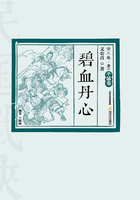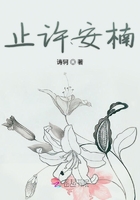IT was yet early in the morning of the following day, when, as I was walking in my garden with my aunt (who took little other exercise now, being so much in attendance on my dear Dora), I was told that Mr. Peggotty desired to speak with me. He came into the garden to meet me half-way, on my going towards the gate; and bared his head, as it was always his custom to do when he saw my aunt, for whom he had a high respect. I had been telling her all that had happened overnight. Without saying a word, she walked up with a cordial face, shook hands with him, and patted him on the arm. It was so expressively done, that she had no need to say a word. Mr. Peggotty understood her quite as well as if she had said a thousand.
‘I'll go in now, Trot,’said my aunt,‘and look after Little Blossom, who will be getting up presently.’
‘Not along of my being heer, ma'am, I hope?’said Mr. Peggotty.‘Unless my wits is gone a bahd's neezing’—by which Mr. Peggotty meant to say, bird's-nesting—‘this morning, 'tis along of me as you're a-going to quit us?’
‘You have something to say, my good friend,’returned my aunt,‘and will do better without me.’
‘By your leave, ma'am,’returned Mr. Peggotty,‘I should take it kind, pervising you doen't mind my clicketten, if you'd bide heer.’
‘Would you?’said my aunt, with short good-nature.‘Then I am sure I will!’
So, she drew her arm through Mr. Peggotty's, and walked with him to a leafy little summer-house there was at the bottom of the garden, where she sat down on a bench, and I beside her. There was a seat for Mr. Peggotty too, but he preferred to stand, leaning his hand on the small rustic table. As he stood, looking at his cap for a little while before beginning to speak, I could not help observing what power and force of character his sinewy hand expressed, and what a good and trusty companion it was to his honest brow and iron-grey hair.
‘I took my dear child away last night,’Mr. Peggotty began, as he raised his eyes to ours,‘to my lodging, wheer I have a long time been expecting of her and preparing fur her. It was hours afore she knowed me right; and when she did, she kneeled down at my feet, and kiender said to me, as if it was her prayers, how it all come to be. You may believe me, when I heerd her voice, as I had heerd at home so playful—and see her humbled, as it might be in the dust our Saviour wrote in with his blessed hand—I felt a wownd go to my 'art, in the midst of all its thankfulness.’
He drew his sleeve across his face, without any pretence of concealing why; and then cleared his voice.
‘It warn't for long as I felt that; for she was found. I had on'y to think as she was found, and it was gone. I doen't know why I do so much as mention of it now, I'm sure. I didn't have it in my mind a minute ago, to say a word about myself; but it come up so nat'ral, that I yielded to it afore I was aweer.’
‘You are a self-denying soul,’said my aunt,‘and will have your reward.’
Mr. Peggotty, with the shadows of the leaves playing athwart his face, made a surprised inclination of the head towards my aunt, as an acknowledgement of her good opinion; then took up the thread he had relinquished.
‘When my Em'ly took flight,’he said, in stern wrath for the moment,‘from the house wheer she was made a prisoner by that theer spotted snake as Mas'r Davy see,—and his story's trew, and may GOD confound him!—she took flight in the night. It was a dark night, with a many stars a-shining. She was wild. She ran along the sea beach, believing the old boat was theer; and calling out to us to turn away our faces, for she was a-coming by. She heerd herself a-crying out, like as if it was another person; and cut herself on them sharp-pinted stones and rocks, and felt it no more than if she had been rock herself. Ever so fur she run, and there was fire afore her eyes, and roarings in her ears. Of a sudden—or so she thowt, you unnerstand—the day broke, wet and windy, and she was lying b'low a heap of stone upon the shore, and a woman was a-speaking to her, saying, in the language of that country, what was it as had gone so much amiss?’
He saw everything he related. It passed before him, as he spoke, so vividly, that, in the intensity of his earnestness, he presented what he described to me, with greater distinctness than I can express. I can hardly believe, writing now long afterwards, but that I was actually present in these scenes; they are impressed upon me with such an astonishing air of fidelity.
‘As Em'ly's eyes—which was heavy—see this woman better,’Mr. Peggotty went on,‘she know'd as she was one of them as she had often talked to on the beach. Fur, though she had run (as I have said) ever so fur in the night, she had oftentimes wandered long ways, partly afoot, partly in boats and carriages, and know'd all that country,’long the coast, miles and miles. She hadn't no children of her own, this woman, being a young wife; but she was a-looking to have one afore long. And may my prayers go up to Heaven that‘twill be a happiness to her, and a comfort, and a honour, all her life! May it love her and be dootiful to her, in her old age; helpful of her at the last; a Angel to her heer, and heerafter!’
‘Amen!’said my aunt.
‘She had been summat timorous and down,’said Mr. Peggotty,‘and had sat, at first, a little way off, at her spinning, or such work as it was, when Em'ly talked to the children. But Em'ly had took notice of her, and had gone and spoke to her; and as the young woman was partial to the children herself, they had soon made friends. Sermuchser, that when Em'ly went that way, she always giv Em'ly flowers. This was her as now asked what it was that had gone so much amiss. Em'ly told her, and she—took her home. She did indeed. She took her home,’said Mr. Peggotty, covering his face.
He was more affected by this act of kindness, than I had ever seen him affected by anything since the night she went away. My aunt and I did not attempt to disturb him.
‘It was a little cottage, you may suppose,’he said, presently,‘but she found space for Em'ly in it,—her husband was away at sea,—and she kep it secret, and prevailed upon such neighbours as she had (they was not many near) to keep it secret too. Em'ly was took bad with fever, and, what is very strange to me is,—maybe 'tis not so strange to scholars,—the language of that country went out of her head, and she could only speak her own, that no one unnerstood. She recollects, as if she had dreamed it, that she lay there always a-talking her own tongue, always believing as the old boat was round the next pint in the bay, and begging and imploring of 'em to send theer and tell how she was dying, and bring back a message of forgiveness, if it was on'y a wured. A'most the whole time, she thowt,—now, that him as I made mention on just now was lurking for her unnerneath the winder; now that him as had brought her to this was in the room,—and cried to the good young woman not to give her up, and know'd, at the same time, that she couldn't unnerstand, and dreaded that she must be took away. Likewise the fire was afore her eyes, and the roarings in her ears; and theer was no today, nor yesterday, nor yet tomorrow; but everything in her life as ever had been, or as ever could be, and everything as never had been, and as never could be, was a crowding on her all at once, and nothing clear nor welcome, and yet she sang and laughed about it! How long this lasted, I doen't know; but then theer come a sleep; and in that sleep, from being a many times stronger than her own self, she fell into the weakness of the littlest child.’
Here he stopped, as if for relief from the terrors of his own description. After being silent for a few moments, he pursued his story.
‘It was a pleasant arternoon when she awoke; and so quiet, that there warn't a sound but the rippling of that blue sea without a tide, upon the shore. It was her belief, at first, that she was at home upon a Sunday morning; but the vine leaves as she see at the winder, and the hills beyond, warn't home, and contradicted of her. Then, come in her friend to watch alongside of her bed; and then she know'd as the old boat warn't round that next pint in the bay no more, but was fur off; and know'd where she was, and why; and broke out a-crying on that good young woman's bosom, wheer I hope her baby is a-lying now, a-cheering of her with its pretty eyes!’
He could not speak of this good friend of Emily's without a flow of tears. It was in vain to try. He broke down again, endeavouring to bless her!
‘That done my Em'ly good,’he resumed, after such emotion as I could not behold without sharing in; and as to my aunt, she wept with all her heart;‘that done Em'ly good, and she begun to mend. But, the language of that country was quite gone from her, and she was forced to make signs. So she went on, getting better from day to day, slow, but sure, and trying to learn the names of common things—names as she seemed never to have heerd in all her life—till one evening come, when she was a-setting at her window, looking at a little girl at play upon the beach. And of a sudden this child held out her hand, and said, what would be in English,“Fisherman's daughter, here's a shell!”—for you are to unnerstand that they used at first to call her“Pretty lady”, as the general way in that country is, and that she had taught 'em to call her“Fisherman's daughter”instead. The child says of a sudden,“Fisherman's daughter, here's a shell!”Then Em'ly unnerstands her; and she answers, bursting out a-crying; and it all comes back!
‘When Em'ly got strong again,’said Mr. Peggotty, after another short interval of silence,‘she cast about to leave that good young creetur, and get to her own country. The husband was come home, then; and the two together put her aboard a small trader bound to Leghorn, and from that to France. She had a little money, but it was less than little as they would take for all they done. I'm a'most glad on it, though they was so poor! What they done, is laid up wheer neither moth or rust doth corrupt, and wheer thieves do not break through nor steal. Mas'r Davy, it'll outlast all the treasure in the wureld.
‘Em'ly got to France, and took service to wait on travelling ladies at a inn in the port. Theer, theer come, one day, that snake.—Let him never come nigh me. I doen't know what hurt I might do him!—Soon as she see him, without him seeing her, all her fear and wildness returned upon her, and she fled afore the very breath he draw'd. She come to England, and was set ashore at Dover.
‘I doen't know,’said Mr. Peggotty,‘for sure, when her‘art begun to fail her; but all the way to England she had thowt to come to her dear home. Soon as she got to England she turned her face tow'rds it. But, fear of not being forgiv, fear of being pinted at, fear of some of us being dead along of her, fear of many things, turned her from it, kiender by force, upon the road:“Uncle, uncle,”she says to me,“the fear of not being worthy to do what my torn and bleeding breast so longed to do, was the most fright'ning fear of all! I turned back, when my 'art was full of prayers that I might crawl to the old door-step, in the night, kiss it, lay my wicked face upon it, and theer be found dead in the morning.”
‘She come,’said Mr. Peggotty, dropping his voice to an awe-stricken whisper,‘to London. She—as had never seen it in her life—alone—without a penny—young—so pretty—come to London. A'most the moment as she lighted heer, all so desolate, she found (as she believed) a friend; a decent woman as spoke to her about the needle-work as she had been brought up to do, about finding plenty of it fur her, about a lodging fur the night, and ****** secret inquiration concerning of me and all at home, tomorrow. When my child,’he said aloud, and with an energy of gratitude that shook him from head to foot,‘stood upon the brink of more than I can say or think on—Martha, trew to her promise, saved her.’
I could not repress a cry of joy.
‘Mas'r Davy!’said he, gripping my hand in that strong hand of his,‘it was you as first made mention of her to me. I thankee, sir! She was arnest. She had know'd of her bitter knowledge wheer to watch and what to do. She had done it. And the Lord was above all! She come, white and hurried, upon Em'ly in her sleep. She says to her,“Rise up from worse than death, and come with me!”Them belonging to the house would have stopped her, but they might as soon have stopped the sea.“Stand away from me,”she says,“I am a ghost that calls her from beside her open grave!”She told Em'ly she had seen me, and know'd I loved her, and forgive her. She wrapped her, hasty, in her clothes. She took her, faint and trembling, on her arm. She heeded no more what they said, than if she had had no ears. She walked among 'em with my child, minding only her; and brought her safe out, in the dead of the night, from that black pit of ruin!
‘She attended on Em'ly,’said Mr. Peggotty, who had released my hand, and put his own hand on his heaving chest;‘she attended to my Em'ly, lying wearied out, and wandering betwixt whiles, till late next day. Then she went in search of me; then in search of you, Mas'r Davy. She didn't tell Em'ly what she come out fur, lest her 'art should fail, and she should think of hiding of herself. How the cruel lady know'd of her being theer, I can't say. Whether him as I have spoke so much of, chanced to see 'em going theer, or whether (which is most like, to my thinking) he had heerd it from the woman, I doen't greatly ask myself. My niece is found.
‘All night long,’said Mr. Peggotty,‘we have been together, Em'ly and me. ’Tis little (considering the time) as she has said, in wureds, through them broken-hearted tears; 'tis less as I have seen of her dear face, as grow'd into a woman's at my hearth. But, all night long, her arms has been about my neck; and her head has laid heer; and we knows full well, as we can put our trust in one another, ever more.’
He ceased to speak, and his hand upon the table rested there in perfect repose, with a resolution in it that might have conquered lions.
‘It was a gleam of light upon me, Trot,’said my aunt, drying her eyes,‘when I formed the resolution of being godmother to your sister Betsey Trotwood, who disappointed me; but, next to that, hardly anything would have given me greater pleasure, than to be godmother to that good young creature's baby!’
Mr. Peggotty nodded his understanding of my aunt's feelings, but could not trust himself with any verbal reference to the subject of her commendation. We all remained silent, and occupied with our own reflections (my aunt drying her eyes, and now sobbing convulsively, and now laughing and calling herself a fool); until I spoke.
‘You have quite made up your mind,’said I to Mr. Peggotty,‘as to the future, good friend? I need scarcely ask you.’
‘Quite, Mas'r Davy,’he returned;‘and told Em'ly. Theer's mighty countries, fur from heer. Our future life lays over the sea.’
‘They will emigrate together, aunt,’said I.
‘Yes!’said Mr. Peggotty, with a hopeful smile.‘No one can't reproach my darling in Australia. We will begin a new life over theer!’
I asked him if he yet proposed to himself any time for going away.
‘I was down at the Docks early this morning, sir,’he returned,‘to get information concerning of them ships. In about six weeks or two months from now, there'll be one sailing—I see her this morning—went aboard—and we shall take our passage in her.’
‘Quite alone?’I asked.
‘Aye, Mas'r Davy!’he returned.‘My sister, you see, she's that fond of you and yourn, and that accustomed to think on'y of her own country, that it wouldn't be hardly fair to let her go. Besides which, theer's one she has in charge, Mas'r Davy, as doen't ought to be forgot.’
‘Poor Ham!’said I.
‘My good sister takes care of his house, you see, ma'am, and he takes kindly to her,’Mr. Peggotty explained for my aunt's better information.‘He'll set and talk to her, with a calm spirit, wen it's like he couldn't bring himself to open his lips to another. Poor fellow!’said Mr. Peggotty, shaking his head,‘theer's not so much left him, that he could spare the little as he has!’
‘And Mrs. Gummidge?’said I.
‘Well, I've had a mort of consideration, I do tell you,’returned Mr. Peggotty, with a perplexed look which gradually cleared as he went on,‘concerning of Missis Gummidge. You see, wen Missis Gummidge falls a-thinking of the old 'un, she an't what you may call good company. Betwixt you and me, Mas'r Davy—and you, ma'am—wen Mrs. Gummidge takes to wimicking,’—our old country word for crying,—‘she's liable to be considered to be, by them as didn't know the old 'un, peevish-like. Now I DID know the old 'un,’said Mr. Peggotty,‘and I know'd his merits, so I unnerstan’her; but 'tan't entirely so, you see, with others—nat'rally can't be!’
My aunt and I both acquiesced.
‘Wheerby,’said Mr. Peggotty,‘my sister might—I doen't say she would, but might—find Missis Gummidge give her a leetle trouble now-and-again. Theerfur’tan't my intentions to moor Missis Gummidge‘long with them, but to find a Beein' fur her wheer she can fisherate for herself.’(A Beein' signifies, in that dialect, a home, and to fisherate is to provide.)‘Fur which purpose,’said Mr. Peggotty,‘I means to make her a 'lowance afore I go, as'll leave her pretty comfort'ble. She's the faithfullest of creeturs.’‘Tan't to be expected, of course, at her time of life, and being lone and lorn, as the good old Mawther is to be knocked about aboardship, and in the woods and wilds of a new and fur-away country. So that's what I'm a-going to do with her.’
He forgot nobody. He thought of everybody's claims and strivings, but his own.
‘Em'ly,’he continued,‘will keep along with me—poor child, she's sore in need of peace and rest!—until such time as we goes upon our voyage. She'll work at them clothes, as must be made; and I hope her troubles will begin to seem longer ago than they was, wen she finds herself once more by her rough but loving uncle.’
My aunt nodded confirmation of this hope, and imparted great satisfaction to Mr. Peggotty.
‘Theer's one thing furder, Mas'r Davy,’said he, putting his hand in his breast-pocket, and gravely taking out the little paper bundle I had seen before, which he unrolled on the table.‘Theer's these here banknotes—fifty pound, and ten. To them I wish to add the money as she come away with. I've asked her about that (but not saying why), and have added of it up. I an't a scholar. Would you be so kind as see how 'tis?’
He handed me, apologetically for his scholarship, a piece of paper, and observed me while I looked it over. It was quite right.
‘Thankee, sir,’he said, taking it back.‘This money, if you doen't see objections, Mas'r Davy, I shall put up jest afore I go, in a cover directed to him; and put that up in another, directed to his mother. I shall tell her, in no more wureds than I speak to you, what it's the price on; and that I'm gone, and past receiving of it back.’
I told him that I thought it would be right to do so—that I was thoroughly convinced it would be, since he felt it to be right.
‘I said that theer was on'y one thing furder,’he proceeded with a grave smile, when he had made up his little bundle again, and put it in his pocket;‘but theer was two. I warn't sure in my mind, wen I come out this morning, as I could go and break to Ham, of my own self, what had so thankfully happened. So I writ a letter while I was out, and put it in the post-office, telling of 'em how all was as 'tis; and that I should come down tomorrow to unload my mind of what little needs a-doing of down theer, and, most-like, take my farewell leave of Yarmouth.’
‘And do you wish me to go with you?’said I, seeing that he left something unsaid.
‘If you could do me that kind favour, Mas'r Davy,’he replied.‘I know the sight on you would cheer 'em up a bit.’
My little Dora being in good spirits, and very desirous that I should go—as I found on talking it over with her—I readily pledged myself to accompany him in accordance with his wish. Next morning, consequently, we were on the Yarmouth coach, and again travelling over the old ground.
As we passed along the familiar street at night—Mr. Peggotty, in despite of all my remonstrances, carrying my bag—I glanced into Omer and Joram's shop, and saw my old friend Mr. Omer there, smoking his pipe. I felt reluctant to be present, when Mr. Peggotty first met his sister and Ham; and made Mr. Omer my excuse for lingering behind.
‘How is Mr. Omer, after this long time?’said I, going in.
He fanned away the smoke of his pipe, that he might get a better view of me, and soon recognized me with great delight.
‘I should get up, sir, to acknowledge such an honour as this visit,’said he,‘only my limbs are rather out of sorts, and I am wheeled about. With the exception of my limbs and my breath, howsoever, I am as hearty as a man can be, I'm thankful to say.’
I congratulated him on his contented looks and his good spirits, and saw, now, that his easy-chair went on wheels.
‘It's an ingenious thing, ain't it?’he inquired, following the direction of my glance, and polishing the elbow with his arm.‘It runs as light as a feather, and tracks as true as a mail-coach. Bless you, my little Minnie—my grand-daughter you know, Minnie's child—puts her little strength against the back, gives it a shove, and away we go, as clever and merry as ever you see anything! And I tell you what—it's a most uncommon chair to smoke a pipe in.’
I never saw such a good old fellow to make the best of a thing, and find out the enjoyment of it, as Mr. Omer. He was as radiant, as if his chair, his asthma, and the failure of his limbs, were the various branches of a great invention for enhancing the luxury of a pipe.
‘I see more of the world, I can assure you,’said Mr. Omer,‘in this chair, than ever I see out of it. You'd be surprised at the number of people that looks in of a day to have a chat. You really would! There's twice as much in the newspaper, since I've taken to this chair, as there used to be. As to general reading, dear me, what a lot of it I do get through! That's what I feel so strong, you know! If it had been my eyes, what should I have done? If it had been my ears, what should I have done? Being my limbs, what does it signify? Why, my limbs only made my breath shorter when I used 'em. And now, if I want to go out into the street or down to the sands, I've only got to call ****, Joram's youngest 'prentice, and away I go in my own carriage, like the Lord Mayor of London.’
He half suffocated himself with laughing here.
‘Lord bless you!’said Mr. Omer, resuming his pipe,‘a man must take the fat with the lean; that's what he must make up his mind to, in this life. Joram does a fine business. Ex-cellent business!’
‘I am very glad to hear it,’said I.
‘I knew you would be,’said Mr. Omer.‘And Joram and Minnie are like Valentines. What more can a man expect? What's his limbs to that!’
His supreme contempt for his own limbs, as he sat smoking, was one of the pleasantest oddities I have ever encountered.
‘And since I've took to general reading, you've took to general writing, eh, sir?’said Mr. Omer, surveying me admiringly.‘What a lovely work that was of yours! What expressions in it! I read it every word—every word. And as to feeling sleepy! Not at all!’
I laughingly expressed my satisfaction, but I must confess that I thought this association of ideas significant.
‘I give you my word and honour, sir,’said Mr. Omer,‘that when I lay that book upon the table, and look at it outside; compact in three separate and indiwidual wollumes—one, two, three; I am as proud as Punch to think that I once had the honour of being connected with your family. And dear me, it's a long time ago, now, ain't it? Over at Blunderstone. With a pretty little party laid along with the other party. And you quite a small party then, yourself. Dear, dear!’
I changed the subject by referring to Emily. After assuring him that I did not forget how interested he had always been in her, and how kindly he had always treated her, I gave him a general account of her restoration to her uncle by the aid of Martha; which I knew would please the old man. He listened with the utmost attention, and said, feelingly, when I had done:
‘I am rejoiced at it, sir! It's the best news I have heard for many a day. Dear, dear, dear! And what's going to be undertook for that unfortunate young woman, Martha, now?’
‘You touch a point that my thoughts have been dwelling on since yesterday,’said I,‘but on which I can give you no information yet, Mr. Omer. Mr. Peggotty has not alluded to it, and I have a delicacy in doing so. I am sure he has not forgotten it. He forgets nothing that is disinterested and good.’
‘Because you know,’said Mr. Omer, taking himself up, where he had left off,‘whatever is done, I should wish to be a member of. Put me down for anything you may consider right, and let me know. I never could think the girl all bad, and I am glad to find she's not. So will my daughter Minnie be. Young women are contradictory creatures in some things—her mother was just the same as her—but their hearts are soft and kind. It's all show with Minnie, about Martha. Why she should consider it necessary to make any show, I don't undertake to tell you. But it's all show, bless you. She'd do her any kindness in private. So, put me down for whatever you may consider right, will you be so good? and drop me a line where to forward it. Dear me!’said Mr. Omer,‘when a man is drawing on to a time of life, where the two ends of life meet; when he finds himself, however hearty he is, being wheeled about for the second time, in a speeches of go-cart; he should be over-rejoiced to do a kindness if he can. He wants plenty. And I don't speak of myself, particular,’said Mr. Omer,‘because, sir, the way I look at it is, that we are all drawing on to the bottom of the hill, whatever age we are, on account of time never standing still for a single moment. So let us always do a kindness, and be over-rejoiced. To be sure!’
He knocked the ashes out of his pipe, and put it on a ledge in the back of his chair, expressly made for its reception.
‘There's Em'ly's cousin, him that she was to have been married to,’said Mr. Omer, rubbing his hands feebly,‘as fine a fellow as there is in Yarmouth! He'll come and talk or read to me, in the evening, for an hour together sometimes. That's a kindness, I should call it! All his life's a kindness.’
‘I am going to see him now,’said I.
‘Are you?’said Mr. Omer.‘Tell him I was hearty, and sent my respects. Minnie and Joram's at a ball. They would be as proud to see you as I am, if they was at home. Minnie won't hardly go out at all, you see,“on account of father”, as she says. So I swore tonight, that if she didn't go, I'd go to bed at six. In consequence of which,’Mr. Omer shook himself and his chair with laughter at the success of his device,‘she and Joram's at a ball.’
I shook hands with him, and wished him good night.
‘Half a minute, sir,’said Mr. Omer.‘If you was to go without seeing my little elephant, you'd lose the best of sights. You never see such a sight! Minnie!’A musical little voice answered, from somewhere upstairs,‘I am coming, grandfather!’and a pretty little girl with long, flaxen, curling hair, soon came running into the shop.
‘This is my little elephant, sir,’said Mr. Omer, fondling the child.‘Siamese breed, sir. Now, little elephant!’
The little elephant set the door of the parlour open, enabling me to see that, in these latter days, it was converted into a bedroom for Mr. Omer who could not be easily conveyed upstairs; and then hid her pretty forehead, and tumbled her long hair, against the back of Mr. Omer's chair.
‘The elephant butts, you know, sir,’said Mr. Omer, winking,‘when he goes at a object. Once, elephant. Twice. Three times!’
At this signal, the little elephant, with a dexterity that was next to marvellous in so small an animal, whisked the chair round with Mr. Omer in it, and rattled it off, pell-mell, into the parlour, without touching the door-post: Mr. Omer indescribably enjoying the performance, and looking back at me on the road as if it were the triumphant issue of his life's exertions.
After a stroll about the town I went to Ham's house. Peggotty had now removed here for good; and had let her own house to the successor of Mr. Barkis in the carrying business, who had paid her very well for the good-will, cart, and horse. I believe the very same slow horse that Mr. Barkis drove was still at work.
I found them in the neat kitchen, accompanied by Mrs. Gummidge, who had been fetched from the old boat by Mr. Peggotty himself. I doubt if she could have been induced to desert her post, by anyone else. He had evidently told them all. Both Peggotty and Mrs. Gummidge had their aprons to their eyes, and Ham had just stepped out‘to take a turn on the beach’. He presently came home, very glad to see me; and I hope they were all the better for my being there. We spoke, with some approach to cheerfulness, of Mr. Peggotty's growing rich in a new country, and of the wonders he would describe in his letters. We said nothing of Emily by name, but distantly referred to her more than once. Ham was the serenest of the party.
But, Peggotty told me, when she lighted me to a little chamber where the Crocodile book was lying ready for me on the table, that he always was the same. She believed (she told me, crying) that he was broken-hearted; though he was as full of courage as of sweetness, and worked harder and better than any boat-builder in any yard in all that part. There were times, she said, of an evening, when he talked of their old life in the boat-house; and then he mentioned Emily as a child. But, he never mentioned her as a woman.
I thought I had read in his face that he would like to speak to me alone. I therefore resolved to put myself in his way next evening, as he came home from his work. Having settled this with myself, I fell asleep. That night, for the first time in all those many nights, the candle was taken out of the window, Mr. Peggotty swung in his old hammock in the old boat, and the wind murmured with the old sound round his head.
All next day, he was occupied in disposing of his fishing-boat and tackle; in packing up, and sending to London by waggon, such of his little domestic possessions as he thought would be useful to him; and in parting with the rest, or bestowing them on Mrs. Gummidge. She was with him all day. As I had a sorrowful wish to see the old place once more, before it was locked up, I engaged to meet them there in the evening. But I so arranged it, as that I should meet Ham first.
It was easy to come in his way, as I knew where he worked. I met him at a retired part of the sands, which I knew he would cross, and turned back with him, that he might have leisure to speak to me if he really wished. I had not mistaken the expression of his face. We had walked but a little way together, when he said, without looking at me:
‘Mas'r Davy, have you seen her?’
‘Only for a moment, when she was in a swoon,’I softly answered.
We walked a little farther, and he said:
‘Mas'r Davy, shall you see her, d'ye think?’
‘It would be too painful to her, perhaps,’said I.
‘I have thowt of that,’he replied.‘So 'twould, sir, so 'twould.’
‘But, Ham,’said I, gently,‘if there is anything that I could write to her, for you, in case I could not tell it; if there is anything you would wish to make known to her through me; I should consider it a sacred trust.’
‘I am sure on't. I thankee, sir, most kind! I think theer is something I could wish said or wrote.’
‘What is it?’
We walked a little farther in silence, and then he spoke.
‘’Tan't that I forgive her. ’Tan't that so much. ’Tis more as I beg of her to forgive me, for having pressed my affections upon her. Odd times, I think that if I hadn't had her promise fur to marry me, sir, she was that trustful of me, in a friendly way, that she'd have told me what was struggling in her mind, and would have counselled with me, and I might have saved her.’
I pressed his hand.‘Is that all?’
‘Theer's yet a something else,’he returned,‘if I can say it, Mas'r Davy.’
We walked on, farther than we had walked yet, before he spoke again. He was not crying when he made the pauses I shall express by lines. He was merely collecting himself to speak very plainly.
‘I loved her—and I love the mem'ry of her—too deep—to be able to lead her to believe of my own self as I'm a happy man. I could only be happy—by forgetting of her—and I'm afeerd I couldn't hardly bear as she should be told I done that. But if you, being so full of learning, Mas'r Davy, could think of anything to say as might bring her to believe I wasn't greatly hurt: still loving of her, and mourning for her: anything as might bring her to believe as I was not tired of my life, and yet was hoping fur to see her without blame, wheer the wicked cease from troubling and the weary are at rest—anything as would ease her sorrowful mind, and yet not make her think as I could ever marry, or as 'twas possible that anyone could ever be to me what she was—I should ask of you to say that—with my prayers for her—that was so dear.’
I pressed his manly hand again, and told him I would charge myself to do this as well as I could.
‘I thankee, sir,’he answered.‘’Twas kind of you to meet me. ’Twas kind of you to bear him company down. Mas'r Davy, I unnerstan’very well, though my aunt will come to Lon'on afore they sail, and they'll unite once more, that I am not like to see him agen. I fare to feel sure on't. We doen't say so, but so 'twill be, and better so. The last you see on him—the very last—will you give him the lovingest duty and thanks of the orphan, as he was ever more than a father to?’
This I also promised, faithfully.
‘I thankee agen, sir,’he said, heartily shaking hands.‘I know wheer you're a-going. Good-bye!’
With a slight wave of his hand, as though to explain to me that he could not enter the old place, he turned away. As I looked after his figure, crossing the waste in the moonlight, I saw him turn his face towards a strip of silvery light upon the sea, and pass on, looking at it, until he was a shadow in the distance.
The door of the boat-house stood open when I approached; and, on entering, I found it emptied of all its furniture, saving one of the old lockers, on which Mrs. Gummidge, with a basket on her knee, was seated, looking at Mr. Peggotty. He leaned his elbow on the rough chimney-piece, and gazed upon a few expiring embers in the grate; but he raised his head, hopefully, on my coming in, and spoke in a cheery manner.
‘Come, according to promise, to bid farewell to 't, eh, Mas'r Davy?’he said, taking up the candle.‘Bare enough, now, an't it?’‘Indeed you have made good use of the time,’said I.
‘Why, we have not been idle, sir. Missis Gummidge has worked like a—I doen't know what Missis Gummidge an't worked like,’said Mr. Peggotty, looking at her, at a loss for a sufficiently approving simile.
Mrs. Gummidge, leaning on her basket, made no observation.
‘Theer's the very locker that you used to sit on, 'long with Em'ly!’said Mr. Peggotty, in a whisper.‘I'm a-going to carry it away with me, last of all. And heer's your old little bedroom, see, Mas'r Davy! A'most as bleak tonight, as 'art could wish!’
In truth, the wind, though it was low, had a solemn sound, and crept around the deserted house with a whispered wailing that was very mournful. Everything was gone, down to the little mirror with the oyster-shell frame. I thought of myself, lying here, when that first great change was being wrought at home. I thought of the blue-eyed child who had enchanted me. I thought of Steerforth: and a foolish, fearful fancy came upon me of his being near at hand, and liable to be met at any turn.
‘’Tis like to be long,’said Mr. Peggotty, in a low voice,‘afore the boat finds new tenants. They look upon 't, down beer, as being unfortunate now!’
‘Does it belong to anybody in the neighbourhood?’I asked.
‘To a mast-maker up town,’said Mr. Peggotty.‘I'm a-going to give the key to him tonight.’
We looked into the other little room, and came back to Mrs. Gummidge, sitting on the locker, whom Mr. Peggotty, putting the light on the chimney-piece, requested to rise, that he might carry it outside the door before extinguishing the candle.
‘Dan'l,’said Mrs. Gummidge, suddenly deserting her basket, and clinging to his arm‘my dear Dan'l, the parting words I speak in this house is, I mustn't be left behind. Doen't ye think of leaving me behind, Dan'l! Oh, doen't ye ever do it!’
Mr. Peggotty, taken aback, looked from Mrs. Gummidge to me, and from me to Mrs. Gummidge, as if he had been awakened from a sleep.
‘Doen't ye, dearest Dan'l, doen't ye!’cried Mrs. Gummidge, fervently.‘Take me 'long with you, Dan'l, take me 'long with you and Em'ly! I'll be your servant, constant and trew. If there's slaves in them parts where you're a-going, I'll be bound to you for one, and happy, but doen't ye leave me behind, Dan'l, that's a deary dear!’
‘My good soul,’said Mr. Peggotty, shaking his head,‘you doen't know what a long voyage, and what a hard life 'tis!’
‘Yes, I do, Dan'l! I can guess!’cried Mrs. Gummidge.‘But my parting words under this roof is, I shall go into the house and die, if I am not took. I can dig, Dan'l. I can work. I can live hard. I can be loving and patient now—more than you think, Dan'l, if you'll on'y try me. I wouldn't touch the‘lowance, not if I was dying of want, Dan'l Peggotty; but I'll go with you and Em'ly, if you'll on'y let me, to the world's end! I know how 'tis; I know you think that I am lone and lorn; but, deary love, 'tan't so no more! I ain't sat here, so long, a-watching, and a-thinking of your trials, without some good being done me. Mas'r Davy, speak to him for me! I knows his ways, and Em'ly's, and I knows their sorrows, and can be a comfort to 'em, some odd times, and labour for 'em allus! Dan'l, deary Dan'l, let me go 'long with you!’
And Mrs. Gummidge took his hand, and kissed it with a homely pathos and affection, in a homely rapture of devotion and gratitude, that he well deserved.
We brought the locker out, extinguished the candle, fastened the door on the outside, and left the old boat close shut up, a dark speck in the cloudy night. Next day, when we were returning to London outside the coach, Mrs. Gummidge and her basket were on the seat behind, and Mrs. Gummidge was happy.















